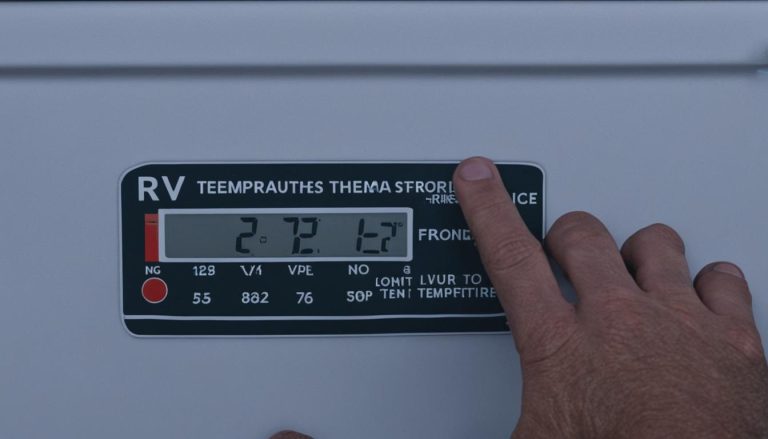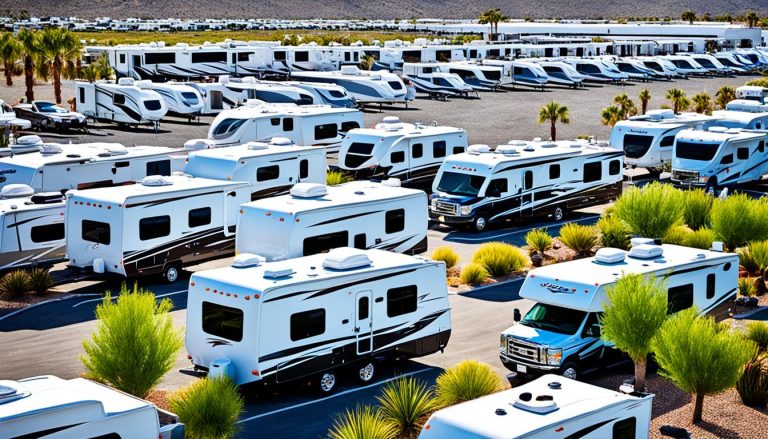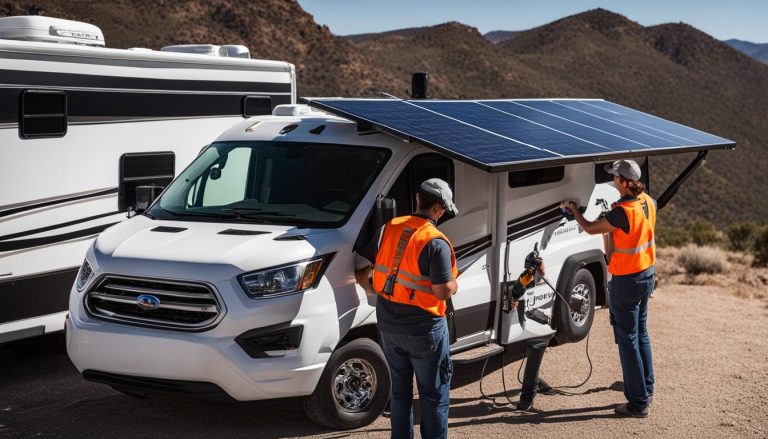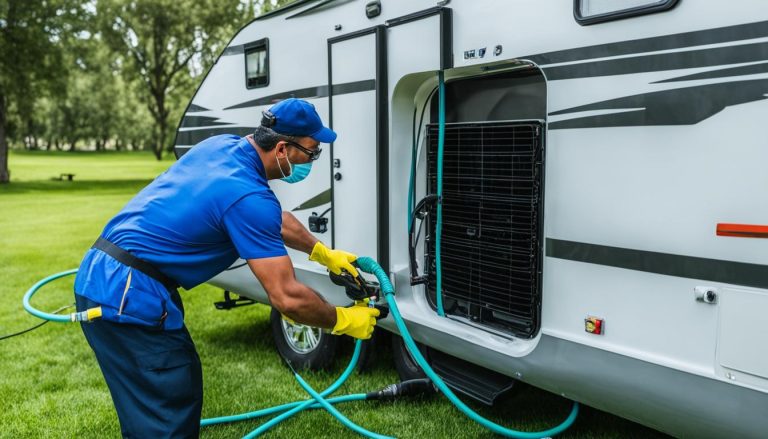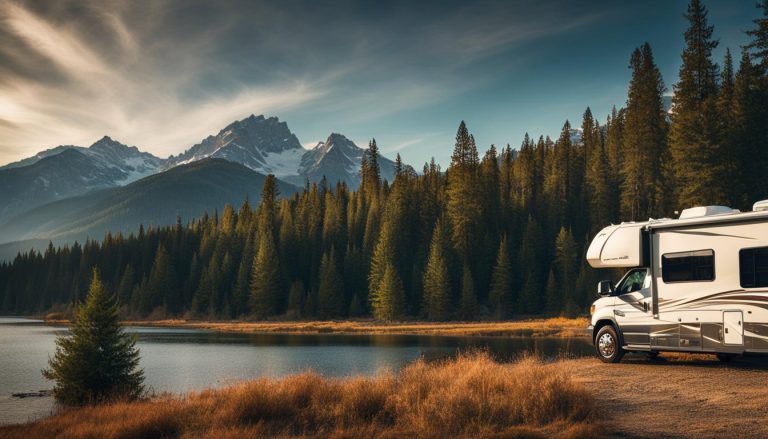Easy Steps to Sanitize Your RV Water Tank
gorvlifestyle.com and its partners may earn a commission if you purchase a product through one of our links
Keeping your RV water tank clean and sanitized is essential for ensuring safe and healthy water during your travels. Over time, bacteria, mold, and mildew can grow in the tank and water lines if proper maintenance is not carried out. This is why regular sanitization is crucial, typically recommended every six months or if you detect any unusual taste or smell in the water. In this section, we will guide you on why sanitizing your RV water tank is important and when you should do it.
Key Takeaways:
- Regularly sanitizing your RV water tank is necessary to ensure safe and clean water for your travels.
- Bacteria, mold, and mildew can grow in the tank and water lines if not properly maintained.
- Sanitization is recommended every six months or if you notice any odd taste or smell in the water.
- By sanitizing the tank, you can kill off any potential pathogens and ensure that the water you use in your RV is clean and safe.
- Proper maintenance and regular sanitization are key to the longevity and functionality of your RV water system.
Why Sanitize Your RV Water Tank?
Ensuring clean and safe water in your RV is of utmost importance for the health and well-being of you and your family. The water used to fill your RV water tank may not always be as clean as you’d like. Over time, bacteria, mold, and mildew can accumulate in the tank and water lines, posing potential health risks.
By regularly sanitizing your RV water tank, you can prevent the growth of harmful bacteria and ensure that the water you use in your RV is clean and safe. Sanitizing the tank kills off any potential pathogens, providing you with peace of mind during your travels.
“Regular sanitization of your RV water tank is crucial to prevent the growth of bacteria and ensure the safety of your water supply.”
When your RV water tank is sanitized, you significantly reduce the risk of waterborne illnesses. Considering the close quarters and limited resources available while traveling in an RV, maintaining a clean and safe water supply is vital.
Sanitizing your RV water tank not only eliminates potential health hazards but also improves the overall taste and quality of the water you use. By regularly cleaning and disinfecting your tank, you can enjoy fresh, clean-tasting water on your journeys.
Importance of Clean and Safe Water in RV
Having access to clean and safe water in your RV is essential for various activities, including drinking, cooking, and personal hygiene. When your water tank is properly sanitized, you can confidently use water from your RV faucets without worrying about contaminants or unpleasant odors.
By prioritizing the cleanliness of your RV water tank, you can prevent the formation of biofilms and slime that often occur when bacteria and other microorganisms grow in the tank. These biofilms not only affect water quality but can also clog the water lines, leading to reduced water flow and potential damage to your RV’s plumbing system.
Preventing Bacteria Growth in RV Water Tank
Regular sanitization of your RV water tank is key to preventing the growth of bacteria, mold, and mildew. Bacteria can thrive in the warm and moist environment of the tank, leading to potential health risks. Sanitizing the tank with a bleach solution kills off these microorganisms, ensuring a safe water supply.
It’s important to note that the frequency of sanitization may vary depending on factors such as water source quality, usage, and climate. However, it is generally recommended to sanitize your RV water tank at least every six months or if you notice any strange taste or smell in the water.
| Benefits of Sanitizing Your RV Water Tank | Preventive Measures |
|---|---|
| Ensures clean and safe water for drinking, cooking, and hygiene | Use a clean water source to fill the tank |
| Eliminates bacteria, mold, and mildew growth | Sanitize the tank every six months or as needed |
| Improves the taste and quality of water | Regularly drain and flush the tank |
| Prevents clogging and damage to the plumbing system | Follow manufacturer’s guidelines for maintenance |
When to Sanitize Your RV Water Tank
Regular maintenance and sanitization of your RV water tank are essential to ensure clean and safe water for your travels. Knowing when to sanitize your tank is crucial for maintaining the longevity and functionality of your RV water system.
It is recommended to sanitize your RV water tank every six months. This regular schedule helps to prevent the buildup of bacteria, mold, and mildew, which can thrive in the moist environment of the tank if left unchecked. By sanitizing every six months, you can effectively eliminate any potential pathogens and keep your water system clean.
In addition to regular six-month intervals, there are some signs that indicate the need for immediate sanitization. If you notice a strange taste or odor in the water, it could be an indication of bacteria growth in the tank. Sanitizing the tank at the earliest sign of these issues ensures that you and your family have access to clean and safe water during your travels.
| Situation | Suggested Action |
|---|---|
| Every six months | Sanitize the RV water tank |
| Strange taste or odor | Sanitize the RV water tank immediately |
| RV in storage for a while | Sanitize the RV water tank before using again |
| Unclean water used to fill the tank | Sanitize the RV water tank as a precaution |
By following the recommended sanitization schedule and addressing any signs that indicate the need for immediate attention, you can ensure that your RV water tank remains clean and safe for your adventures on the road.
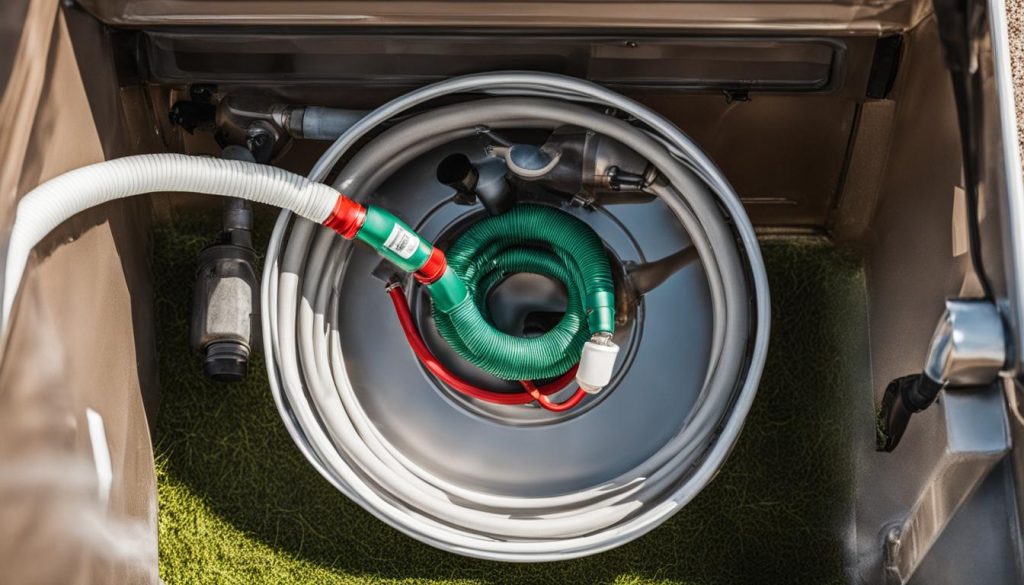
Here’s a helpful tip:
Regularly inspect your RV’s water system for any leaks, cracks, or damage. Keeping an eye on the condition of your tank and water lines can help prevent any issues from escalating and ensure the overall functionality of your RV’s water system.
Supplies Needed to Sanitize Your RV Water Tank
Sanitizing your RV water tank is an essential step to ensure clean and safe water during your travels. To properly sanitize your RV water tank, you will need the following supplies:
- Bleach: Regular bleach is an effective sanitizer for killing bacteria and mold in your RV water tank. Ensure that you use unscented bleach without any additional additives.
- Funnel: A funnel will make it easier to add the bleach mixture into the water tank without any spills.
- Clean Water Source: It is important to have access to a clean water source to replenish the tank after adding the bleach mixture.
Using bleach for RV water tank sanitation has been a widely accepted method due to its effectiveness in killing bacteria and mold. When using bleach, make sure to properly dilute it to achieve the desired concentration for sanitizing your RV water tank.
Tip: Be sure to read the manufacturer’s instructions on the bleach bottle for the recommended bleach-to-water ratio.
Now let’s move on to the step-by-step process of sanitizing your RV water tank and ensuring clean and safe water for your adventures.
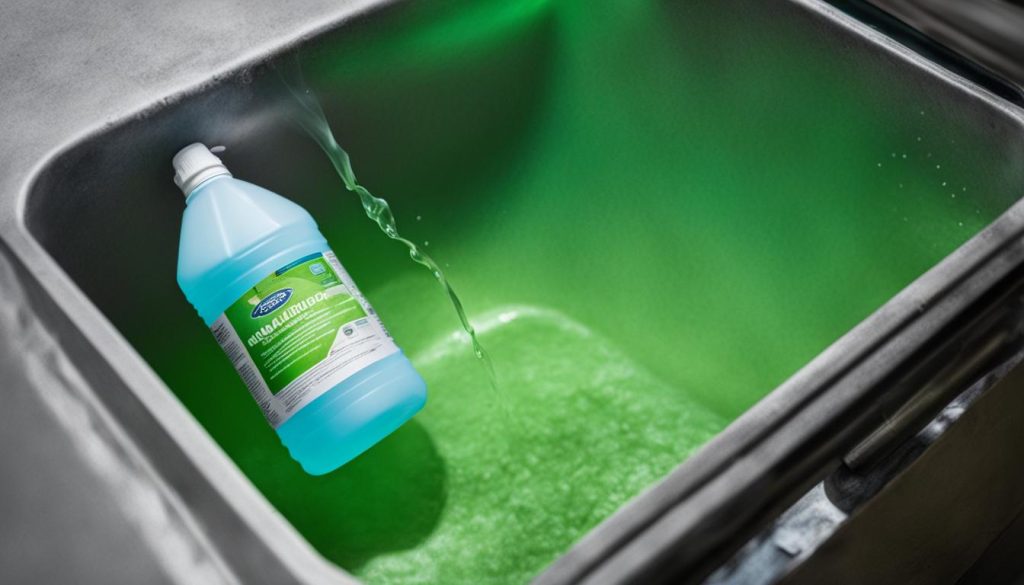
Supplies for RV Water Tank Sanitization
| Supply | Description |
|---|---|
| Bleach | Regular unscented bleach without any additives |
| Funnel | A funnel for easy and mess-free addition of bleach |
| Clean Water Source | A source of clean water to refill the RV water tank |
Steps to Sanitize RV Water Tank
Properly sanitizing your RV water tank is essential for maintaining clean and safe water during your travels. Follow these step-by-step instructions to ensure a thorough cleaning process.
- Turn off the water heater and pump: Before starting the sanitization process, make sure to turn off the water heater and pump to avoid any damage.
- Bypass the water heater and filter (if applicable): If your RV is equipped with a water heater and filter, bypass them to exclude them from the sanitizing process. This step ensures that the cleaning solution reaches all parts of the water system.
- Drain the entire water system: Open all faucets, including the hot and cold water taps, to drain the water system completely. Also, locate and close the low-point drain valves to ensure that all water is removed from the system.
- Create a bleach mixture: In a clean container, mix a solution of 1/4 cup of bleach with 1 gallon of clean water. The bleach will disinfect the tank and water lines, killing any bacteria or mold present.
- Add the bleach mixture to the tank: Using a funnel, pour the bleach mixture into the RV water tank. Take caution to avoid spills and ensure that the bleach mixture is evenly distributed throughout the tank.
- Fill the tank with clean water: After adding the bleach mixture, fill the RV water tank with clean and fresh water. This step helps dilute the bleach solution and further flushes the tank and water lines.
- Turn on the pump and open the faucets: Turn on the water pump and open all faucets, including the hot and cold water taps. Let the bleach solution run through the system for a few minutes to ensure all parts of the water system are sanitized.
- Let the mixture sit: After running the bleach solution through the system, let it sit for a minimum of 24 hours. This allows the bleach to thoroughly disinfect the tank and water lines.
- Drain the tank and lines: Once the mixture has sat for the recommended time, drain the RV water tank and open all faucets to drain the water lines. This step removes any remaining bleach from the system.
- Refill with clean water: After draining the tank and lines, refill the RV water tank with clean and fresh water. This ensures that your water supply is safe and free from any residual bleach.
- Flush the system: Finally, run the faucets once again to flush out any remaining bleach and ensure that the water is clear and odorless.
Following these steps will help you properly sanitize your RV water tank, ensuring that you have clean and safe water during your travels.
Maintenance Tips for RV Water Tank
Keeping your RV water tank clean and well-maintained is essential for ensuring a safe and enjoyable travel experience. In addition to regular sanitization, there are some best practices you can follow to prevent bacteria growth and keep your water tank in optimal condition.
First and foremost, it is highly recommended to use an RV water filter when filling your tank. This will help remove impurities and ensure that the water you’re putting into your tank is clean and safe for use. By using a filter, you can significantly reduce the risk of contaminants entering your water system.
Regularly checking and tightening the hose clamp on the filler tube of your RV water tank is another crucial maintenance task. Over time, these clamps can become loose, leading to potential leaks and water system damage. By ensuring a tight and secure connection, you can prevent any water leakage and maintain the integrity of your tank.
Additionally, it is important to be vigilant for any signs of leaks or damage in your tank or water lines. Keep an eye out for water stains, wet spots, or unusual odors around the tank area. If you notice any of these signs, it is essential to address them promptly to prevent further damage and maintain the cleanliness of your water system.
Lastly, when your RV is not in use for extended periods, it is crucial to drain and flush the water tank regularly. Stagnant water can become a breeding ground for bacteria and other contaminants, leading to foul odors and compromised water quality. By draining and flushing the tank, you can eliminate any residual water and keep your tank fresh and clean for your next adventure.
By following these maintenance tips, you can ensure that your RV water tank remains in optimal condition, preventing bacteria growth and providing you with clean and safe water during your travels.
FAQ
How often should I sanitize my RV water tank?
It is recommended to sanitize your RV water tank every six months or if you notice any strange taste or smell in the water. Additionally, if your RV has been in storage for a while or if you believe that the water used to fill the tank may not have been clean, sanitizing is a good idea.
What supplies do I need to sanitize my RV water tank?
To sanitize your RV water tank, you will need regular bleach, a funnel, and access to a clean water source. The bleach is used to create a sanitizing solution, the funnel is used to add the bleach mixture to the water tank, and the clean water source is used to fill the tank after adding the bleach mixture.
How do I sanitize my RV water tank?
The process to sanitize your RV water tank is straightforward. First, you need to turn off the water heater and pump. Then, bypass the water heater and filter if you have one. Next, drain the entire water system and close the low-point drain valves. After that, create a bleach mixture and add it to the tank, followed by filling the tank with clean water. Then, turn on the pump and open the faucets to run the bleach mixture through the system. Let the mixture sit for 24 hours, drain the tank and lines, and refill with clean water. Finally, run the faucets again to flush out any remaining bleach.
Why is it important to sanitize my RV water tank?
Sanitizing your RV water tank is crucial for the health and safety of you and your family. Bacteria, mold, and mildew can grow in the tank and water lines if not properly maintained. By sanitizing the tank, you can kill off any potential pathogens and ensure that the water you use in your RV is clean and safe.
When should I sanitize my RV water tank?
It is recommended to sanitize your RV water tank every six months or if you notice any odd taste or smell in the water. Additionally, if your RV has been in storage for a while or if you believe that the water used to fill the tank may not have been clean, sanitizing is a good idea. Regular maintenance of the water tank is important to ensure the longevity and functionality of your RV water system.
Are there any maintenance tips for keeping my RV water tank clean?
Yes, there are maintenance tips you can follow to keep your RV water tank clean and in good condition. It is recommended to use an RV water filter when filling the tank to ensure clean water. Regularly check and tighten the hose clamp on the filler tube of the tank. Keep an eye out for any signs of leaks or damage to the tank or water lines. It is also important to regularly drain and flush the tank when not in use for extended periods. By following these maintenance tips, you can prolong the life of your RV water tank and ensure clean water for your travels.

